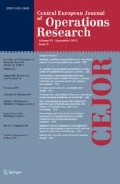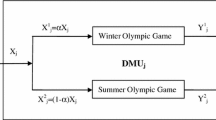Abstract
After important sport events as the Summer Olympic Games (SOG) are, the participating countries are ranked according to the number of gold, silver and bronze medals. A lexicographic ranking is usually applied in official reports which leads to higher ranking of countries with one gold and no other medals comparing to countries without any gold but with several silver or bronze medals. Moreover, this ranking does not take into account the specific conditions of the countries (population, economic strength measured by gross domestic product and tradition in sports). The aim of the paper is not only to evaluate the absolute achievements of the countries but evaluate their performance with respect to the resources they can spent. A two-stage data envelopment analysis model is formulated and solved by an original slack-based measure procedure. The first stage evaluates the performance of the countries in training of athletes and the second stage evaluates the achievements of the nominated athletes. The models with variable returns to scale and weight restrictions are applied. The models and their results are illustrated on the case of Olympic Games 2016 and compared with results given by traditional approaches.

Similar content being viewed by others
References
Andersen P, Petersen NC (1993) A procedure for ranking efficient units in data envelopment analysis. Manage Sci 39:1261–1264
Banker RD, Charnes A, Cooper WW (1984) Some models for estimating technical and scale inefficiencies in data envelopment analysis. Manage Sci 30:1078–1092
Chen Y, Liang L, Zhu J (2009) Equivalence in two-stage DEA approaches. Eur J Oper Res 193:600–604
Churilov L, Flitman A (2006) Towards fair ranking of Olympics achievements: the case of Sydney 2000. Comput Oper Res 33:2057–2082
Guzmán I, Morrow S (2007) Measuring efficiency and productivity in professional football teams: evidence from the English Premier League. Cent Eur J Oper Res 15:309–328
Jablonsky J (2012) Multicriteria approaches for ranking of efficient units in DEA models. Cent Eur J Oper Res 20:435–449
Jablonsky J (2014) MS Excel based software support tools for decision problems with multiple criteria. Procedia Econ Finance 12:251–258
Kao C, Hwang SN (2008) Efficiency decomposition in two-stage data envelopment analysis: an application to non-life insurance companies in Taiwan. Eur J Oper Res 185:418–429
Li Y, Liang L, Chen Y, Morita H (2008) Models for measuring and benchmarking Olympics achievements. Omega 36:933–940
Li Y, Lei X, Dai Q, Liang L (2015) Performance evaluation of participating nation at the 2012 London Summer Olympics by a two-stage data envelopment analysis. Eur J Oper Res 243:964–973
Lins MPE, Gomes EG, de Mello JCS, de Mello AJS (2003) Olympic ranking based on a zero sum gains DEA model. Eur J Oper Res 148:312–322
Lozano S, Villa G, Guerrero F, Cortés P (2002) Measuring the performance of nations at the Summer Olympics using data envelopment analysis. J Oper Res Soc 53:501–511
Mardani A, Jusoh A, Nor K, Khalifah Z, Zakwan N, Valipour A (2015) Multiple criteria decision-making techniques and their applications—a review of the literature from 2000 to 2014. Econ Res Ekonomska Istrazivanja 28:516–571
Shirouyehzad H, Yazdani F (2014) Performance evaluation and ranking of participation Asian countries in 2012 London Olympic Games through data envelopment analysis. J Data Envel Anal Decis Sci 3:1–11
Tiedemann T, Francksen T, Latacz-Lohmann U (2011) Assessing the performance of German Bundesliga football players: a non-parametric metafrontier approach. Cent Eur J Oper Res 19:571–587
Wu J, Liang L, Yang F (2009a) Achievement and benchmarking of countries at the Summer Olympics using cross efficiency evaluation method. Eur J Oper Res 197:722–740
Wu J, Liang L, Chen Y (2009b) DEA game cross-efficiency approach to Olympic rankings. Omega 37:909–918
Zhang D, Li X, Meng W, Liu W (2009) Measuring the performance of nations at the Olympic Games using DEA models with different preferences. J Oper Res Soc 60:983–990
Acknowledgements
The research is supported by the Czech Science Foundation, Project No. 16-01821S.
Author information
Authors and Affiliations
Corresponding author
Rights and permissions
About this article
Cite this article
Jablonsky, J. Ranking of countries in sporting events using two-stage data envelopment analysis models: a case of Summer Olympic Games 2016. Cent Eur J Oper Res 26, 951–966 (2018). https://doi.org/10.1007/s10100-018-0537-8
Published:
Issue Date:
DOI: https://doi.org/10.1007/s10100-018-0537-8




